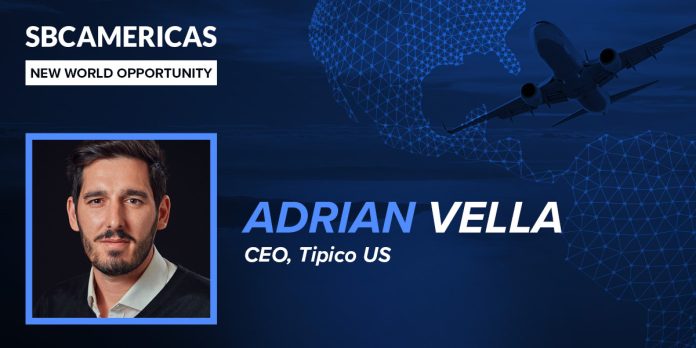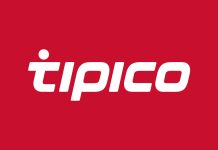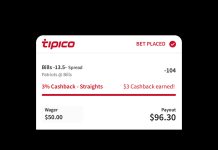Given the vast sporting landscape in the US and the lucrative revenue margins present in monthly state regulator reports, it is unsurprising that the market is attracting significant international attention.
In a country with multiple established local operators, building strong brand recognition is key, and the German-founded Tipico has found success in its marketing strategy, Tipico US CEO Adrian Vella explained to SBC’s New World Opportunity series.
‘Let’s make things interesting’
For Tipico, there are two central pillars to the bookmaker’s stateside marketing approach – a focus on hyperlocality, presenting itself as the ‘local sportsbook for Ohio fans’ in the case of one state; whilst adopting a general approach of ‘amplifying emotions’.
“We already have a perception as being a brand of German heritage and German quality, as well as one of trust,” Vella explained.
“Through our heritage we amplify the emotions of millions of fans and that adds weight. On top of that, we love to take sport seriously and be a brand where we amplify emotions around this.
“Sports are a serious thing, and so you won’t hear lowest common denominator advertisements from us, it’s all about the emotion of sports, as shown by our ‘let’s make this interesting’ tagline.”
In Ohio, the group’s latest state, and the first one where it is first mover, having opened on the regulated market’s day one, the group has added another piece to the puzzle, the aforementioned hyperlocal tactic.
This has seen the firm partner with local newspapers, prominent outlets such as USA Today, the Columbus Crew soccer team, the Rhinegeist Brewery and AEG, hosting events in bars and venues with the latter.
Vella reaffirmed the group’s attitude to hyperlocality: “We are trying to be the local sportsbook for Ohio fans, and that is a very different position than a lot of other nationwide bookmakers.
“There are a number of things that make a strategy – being a first mover, having creative assets, faces to your brand, communication that entices the customer and shows they are being heard – but you want to have trust.
“When you partner with the community with brands that people know, it adds weight to what you’re doing, especially when competing with local long-term casino brands and firms with big marketing budgets.”
The New Jersey beachhead
As Vella noted, Tipico is a long-established brand in its home market of Germany, and like any expanding business when international growth opportunities present themselves, the firm will not sit still.
Having identified the US as ideal ground for its hyperlocal approach and technology experience, the next step was to secure market access. Taking a state-by-state approach, Tipico US is live in New Jersey, Colorado, Ohio and Iowa, with plans for launch in Indiana underway.
“The US is a marathon not a sprint, and there is a lot of potential with the size of the market. We decided to build a US-based business three years ago, with its own operations and management on the ground as well as its own IP and proprietary technology.
“Most of our competition are using a B2B supplier or are sourcing technology from Europe, but if you want to compete you need to invest in greenfield tech built for the US customer, run by a US team – this is what we invested in.
“We now have a competitive product on the market that is multi-state, running a sportsbook and casino with its own trading, modelling, retention and customer activation activities.”
But with 30 US states now allowing some form of online gambling, the majority at least allowing sports betting, why were New Jersey, Colorado, Ohio and Iowa the choices on Tipico’s bet slip?
Explaining the group’s rationale, Vella began with New Jersey. Admittedly, for anyone with a shred of US industry knowledge, it is apparent why the Northeastern state is a strong choice for market entry.
Beginning in long-regulated New Jersey was an ideal place for Tipico to launch its multi-product offering, before trying its hand at multi-state operations by moving westward into Colorado.
“New Jersey was regulated for a long time and we knew it would be competitive,” he said “When you want to build a really effective operation you want to go into the most aggressive market – New Jersey is the beachhead.
“We have now scaled into four states and Ohio is now the centrefold, as this is our debut first-mover state where we have opened with the market. This is what our investment has been leading to.”
Running the marathon
Vella was keen to reiterate that launching and expanding in the US is a ‘marathon not a sprint’ – and like any marathon, it requires preparation and pacing.
The industry is currently in its ‘gold rush’ era and is ‘making strides’, he noted, with more and more states opening their markets to regulated betting and many companies are making moves.
“It is big enough for everyone and there is a space for a great sportsbook product where we can take a good piece of the market,” he continued. “Our focus is on efficiency, driving a good product, providing the best experience, and efficient P&L.
“We’re seeing less bonus spend as the market is maturing. The competition is more P&L conscious than they were two years ago, which benefits the market overall.”
However, marathons are not known for being easy, and rolling out as a betting brand with European origins in the US is no different, but Vella asserted that Tipico has found its pace.
“When we started in the early months the US was booming, so we had to go into bidding wars to get market access, which was challenging at the time but the status quo has changed.”
Something that has not been a challenge for Tipico is regulation, with simple hurdles in the form of cross-state differences relatively easy to cross, the group’s US CEO observed, adding that overall it only has positive impacts.
“They have a process that is different per state – some have their own labs, whilst with others you go through GLI, and some have their own process for management.,” he said.
“Regulation means that everyone is playing on the same battlefield with the same rules, and so even if it is sometimes ‘cumbersome’ it is important and it adds value to the market, to the customer and is good for business.”
The one thing that any European firm interested in the US should take note of, however, is the clear ‘black and white’ difference between consumer preferences.
One only needs to take a look at the US sports calendar to see that American sports fans generally have a far more diverse taste than their European counterparts.
“In Europe you have the majority of your revenue coming from soccer, followed by tennis and other sports, but then its tail down for everything else.
“In the US on a calendar basis, you have January and February, when you move from football into basketball with the Super Bowl followed by March Madness. Then in April to July, you have MLB and hockey, and in September the NFL starts again.
“The spread of the calendar is huge and the content pool is much larger, especially when you factor in college sports. This is not even considering the depths of the products – player props, bet builders and everything else.
“An interesting behaviour coming from fantasy is that in the US people follow players more, and so customers love to combine one event with player props and parlay bets.”
Trading transatlantic lessons
As Tipico US’ CEO noted early on in the interview, the firm has an established background in Europe, having been active for 15 years, and much of this has been underpinned by its technology.
As such, applying lessons from the Old World to the New has been key to the firm’s rollout, including leveraging expertise and knowledge and investing in greenfield technology.
Vella emphasised that at the centre of Tpico’s operations – both in Europe and in the US – is a ‘very talented management team’, and the company holds its in-house control of technology and trading in high regard, all rooted in experience.
“Sportsbook is at the core of our group’s DNA and when you have expertise you can build a great operation and sportsbook,” he said. “You get things right by building it one, two, three or four times, then you get efficient trading, betting, marketing, and everything in between.”
Trading in particular is an area where US players can look to the veteran brands of the mature European market for inspiration, in Vella’s view.
“There are also lessons from retention, bonus allocation and driving an efficient P&L,” he continued. “European business has been optimising that for years, but in the US there has been a cycle of mass acquisition. In these areas in particular we can learn a lot from Europe.”
That is not to say that the US does not have some tricks that the old dog of Europe may want to learn, however, with Vella in particular noting the tendency of American firm’s to be more ‘bullish’ and open to new ideas.
American businesses ‘test and learn’, and are open to new products and incoming niches that have proven popular with many customers, demonstrated by the emergence of micro-betting sites, for example.
“There are lots of companies trying different things. The size of the market and the investment in it, and how vast the offer is from a product perspective, firms are really trying to push the status quo of betting on a more accelerated pace.”
However, European and American consumers and companies do have one major thing in common, that being that ‘as a community everyone is using an app, whether that be for dating, cabs, groceries or betting’.
People on both sides of the Atlantic are now used to a certain level of commodity, experience, usability, and of service, Vella affirmed, and Tipico is keen to address this demand in both continents.
“We believe there is a space for a really good product on the market that is doing something different,” he said, concluding that Tipico US, with its focus on tech, engagement and hyperlocality, is pursuing it with enthusiasm.














